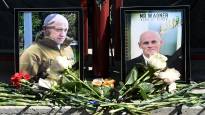MOSCOW Until Thursday evening, Russian official bodies were very tight-lipped about the fate of the founder of the Wagner mercenary company.
Identifying the bodies takes time, but Yevgeny Prigozhin is assumed to be among the victims of the private plane that crashed in the Tver region on Wednesday evening.
The Russian state media treated the incident first and foremost as a plane crash.
Prigozhin’s saga has been so full of twists and turns that it still seems premature to consider his death completely certain.
It’s still openwas the plane shot down, did a bomb explode inside it, or was it an accident.
US officials who spoke to the Reuters news agency said that according to the preliminary version, it could have been a missile launched from the ground.
We can wait for the truth about the suspicious plane crash, but many have recently interpreted it as the Kremlin’s revenge for the fact that Prigozhin crossed the limits of propriety with his June coup attempt.
Finally, the president Vladimir Putin comment on the matter in the evening.
He offered his condolences to the families of Prigožin and others who died in Turma and urged them to wait for the investigation to be completed.
He characterized Prigozhin as a talented businessman who, in addition to Russia, achieved success in Africa. The mercenary company Wagner has offered its services to many autocratic administrations in Africa.
– He had a difficult fate as a person, and he made serious mistakes in his life. But he achieved the necessary results both for himself and when I asked him for a common cause, as in these last months, Putin formulated.
Putin never mentioned Prigozhin’s rebellion project, unless it was one of those mistakes in life.
No comments from the Kremlin will hardly change the state of affairs that many in Russia and outside Russia interpret the destruction of Prigozhin’s plane as an assassination.
The shadow of suspicion still falls over the Kremlin.
Inevitably the president Vladimir Putin the administration does not even want to dispel these doubts.
The seemingly inconvenient death of the hand cashier at least sends a message to the rest of Russia’s elite that the Kremlin should not be defied any longer.
Prigozhin was in many ways the architect of his own destiny. He offered services to the Kremlin as a manager of dirty jobs until he went too far in his power struggle with the Russian military leadership.
An old biblical saying could be updated according to the brutal murder tool favored by the Wagner gang: He who takes the sledgehammer, will perish with the sledgehammer.
Vjorstka online publication tellsthat the reaction in the Russian parliament to the news of Prigozhin’s death was cautiously positive: Prigozhin had stepped on many people’s toes, and the destruction of the plane was seen as revenge by the Kremlin.
After the uprising, many had wondered The moderate attitude of the Russian leadership towards the man whom President Putin had accused on the morning of the June uprising Saturday of the worst possible: treason.
Instead of punishing, Prigozhin was consulted, and he was even seen at the Russia-Africa summit.
Many have compared the course of events to a tactic familiar from mafia movies: first with the opposite party, as if settling old disputes – and then this person is spectacularly murdered.
In St. Petersburg, people carried flowers to Prigozhin’s premises, but it is hard to believe that a large mass movement would arise in Russia from the death of a businessman.
Prigozhin had support in staunchly nationalist circles, but for the vast majority he was not even necessarily a very well-known figure.
Russian state media has not featured him very much – especially during his fierce war of words against the Ministry of Defense.
Still made at the beginning of July in survey research 22 percent of Russians had a positive image of Prigozhin, while 43 percent viewed him negatively and 35 percent neutrally.
Despite everything, Prigožin’s June rebellion already managed to make a dent in Putin’s tough guy image.
Putin’s own account of how he experienced the collapse of the East German regime as a KGB officer at his station in Dresden in 1989 is essentially connected to the carefully constructed hero myth of the Russian president.
When a crowd of protesters stormed the headquarters of East Germany’s secret police, the Stasi, Putin asked Soviet army troops to protect the KGB building. He was told that troops could not be sent because it would require a response from Moscow and Moscow would remain silent.
For Putin, that “Moscow is silent” represented the paralysis of power. For him, the lesson from those days was that such a thing was to be avoided at all costs.
But on Saturday, June 24, as the Wagner forces advanced rapidly towards the capital, Moscow seemed to fall silent again.
For a while, it seemed again as if the power in Russia was paralyzed.
Therefore, it is easy to think that Prigozhin has had to pay for reviving that Putin trauma.
